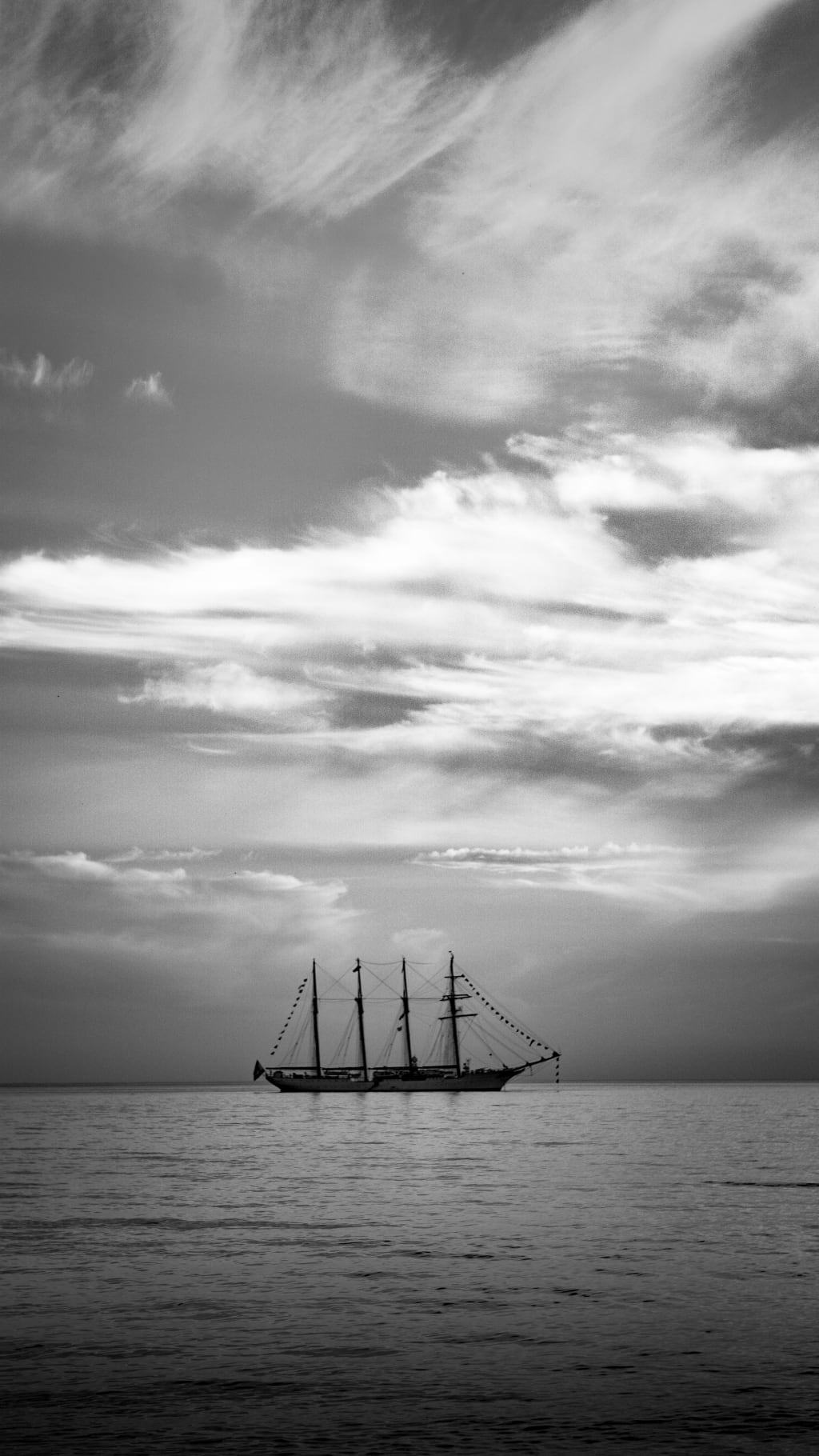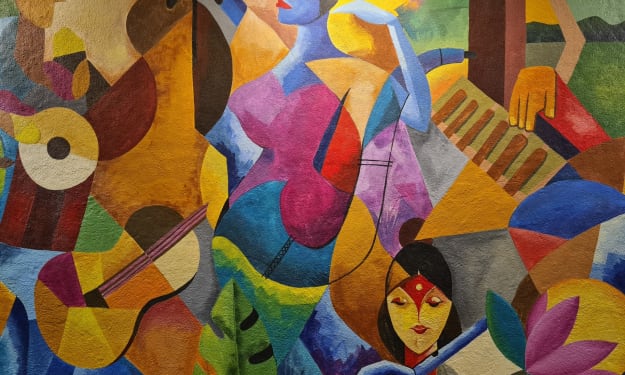Echoes of the only Black man from the Titanic
This is his story.

My anger and frustration knows no bounds as I watch, I am helpless, unable to move. My loving family is drifting slowly away from me. My wife is now left alone to struggle with our two daughters in this dangerous and unpredictably catastrophic nightmare of a night. They said you were unsinkable.
I stand on the deck of the Titanic, clutching the sides so tightly my hands burn. It is freezing cold, but all I feel is the urge to rage against whatever god one believes is watching and listening, and vent my bitter all consuming pent up fury. I could easily ask "why me". But so could all these men, who strangely no longer see me as a pariah. So could all the other souls left on the ship, knowing without a doubt that rescue would not come in time to save us.
How can these musicians still muster the heart to play amidst the maelstrom of agony. It is maddening.
The ship is beginning to split in two. We are sinking, how can this be happening. ~~~~~
4 DAYS EARLIER - APRIL 10, 1912
As we approached this huge magnificently displayed ship, I felt a great deal of apprehension. Glancing around, trying not to appear too conspicuous or inquisitive, I searched the huge crowd for a face that I could identify with. I found none. I hoped that as time progressed, I would feel more at ease.
My name: Joseph Laroche
Born: May 26th, 1889 in Cap Haiten, Haiti.
In order to understand who I am, I must first try to explain as briefly as I can, the history of my country Haiti.
This history began mainly when, after the discovery of 'gold', following the first voyage of Columbus, and the subsequent slavery, ill treatment and extinction of the entire native population of Taino/Arawak (Amerindians), laborers were needed to mine for this non existent or elusive gold.
In 1501, the Spanish monarchs Ferdinand I and Isabella granted permission to the colonists to import African slaves to replace the Taino/Arawak, and they immediately became the main source of labor.
Hence the beginning of my personal story.
"In the 17th and 18th centuries, Spain and France built Haiti’s population by kidnapping and enslaving hundreds of thousands of Afrikans. The new colony, San Domingue, through the heavy importation of Afrikan slaves and massive environmental degradation, rapidly became the wealthiest colony in the Caribbean, with its capital, Cap Français, known as the Paris of the New World.
Haiti became the richest French colony in the entire Americas, including the mineral rich Mexico and Peru, mainly because of the great agricultural riches, in addition to literally working their slaves to death as a result of the extremely harsh working conditions. By 1789, 29,000 African slaves were arriving in San Domingue every year, which meant unspeakable horror for the slaves, as one third died within three years of their arrival, but it meant enormous wealth for France.
Haiti, once known as the Jewel of the Antilles, had developed an agricultural economy based on slave labour which produced sugar cane, coffee, cotton, tobacco, many exotic spices and the dye indigo, which were all in high demand throughout Europe and Asia. This achievement was made possible by the labour and knowledge of thousands of enslaved Africans who brought their technology and expertise to the island.
MANY DOCUMENTS OF WESTERN SLAVERY PUBLICLY STATED THAT THE ULTIMATE THREAT TO A REBELLIOUS SLAVE WAS THAT HE OR SHE WOULD BE SOLD TO HAITI!
For many, many years after Columbus's initial landing Haiti suffered in terror and degradation. There were countless revolutions led by men such as DUTTY BOUKMAN, a Vodoo Priest, TOUSSAINT L'OUVERTURE, an educated Herbal Doctor, who had been a former slave and who rose in the ranks to become a skilled military commander.
The valiant efforts of these two men brought Haiti and surrounding colonies to an era bringing the end of suffering and ushering prosperity once again. Toussaint established such a disciplined and flexible army, that they were able to drive the Spaniards and British invaders out of the colonies. He became governor to the chagrin of the Europeans.
Europeans took umbrage to the success of L'Ouverture.
Napoleon Bonaparte had become powerful in France. He made plans to bring an end to Toussaint's 'Black Republic'.
NAPOLEON'S THREAT
“My decision to destroy the authority of the Blacks in Saint Domingue is not so much based on considerations of commerce and money, as on the need to block forever the march of the Blacks in the world.”
True to his words, France invaded the colonies, but they had underestimated the strength and will of the people. It took ten years, but the French were finally defeated. Napoleon lost over 50,ooo men, including 18 generals.
Toussaint had been captured, but another leader JEAN JACQUES DESSALINES persevered until the defeat. Slavery was more or less abolished in the new colonies.
THIS DEFEAT OF NAPOLEON LED TO THE CEDING OF LOUISANA TO THE U.S.A BY THE FRENCH ON APRIL 30th, 1803.
Haiti was officially born in 1804, and became the second free country in the west after the USA. They were resented by every nation. Everything was done by France, England and the USA to oust Haiti, they refused to trade or aid them in any way towards realizing the dream of independence. The colony was plunged into a monetary debt so overwhelming that the Haitian nation has never recovered.
Haiti still suffers the after effects of it's triumphs and the horrible efforts to subdue a nation, even today.
Jean Jacques Dessalines - A history of Haiti, John Moore
'Among a group of slaves that became free were the mulattos, the children of white masters and slave women. These children were embarrassing to both slaves and whites. The slaves never knew how the white man would respond to his child, and often the slave owner did not want to be reminded of his paternity, so the mulattos were not welcomed in either community. The freed mulattos therefore formed a special middle class in the colonial period.
They were able to receive the best education, operate businesses, own property and in general imitate the French, which became the hallmark of these freed people, as they wanted to be clearly distanced from their slave backgrounds. They adopted the French language, culture, religion, dress, and education, but most importantly, they learnt the value of slave labor, ensuring that the colonial French heritage continued in the elite's imitation of the French labor system'. ~~~~~
MY BIRTH
I was born into this group of people, in a time of uncertainty and displacement. To be totally honest, they became almost as bad as the French masters. Owning slaves and imitating the actions of the slave system.
By the time I was fifteen years old, Haiti was so embroiled in debt that my parents sent me to France where Haitian slaves had been freed, to further my education. I studied Engineering in Beauvais, while there I met Juliette Lafargue who lived in a nearby town, we were married in 1908. We had two children, Simone and Laura.
After finishing my education, I found it extremely hard to secure a job in my chosen field. No one was willing to hire a black man to fill engineering positions. I was subjected to ridicule and many disparaging remarks. I did many odd jobs, but I felt unfulfilled, and I was barely able to take care of my family. I decided to return to my country of Haiti. I believed that, being better equipped with the completion of my studies I would have better choices there.
After discussing the matter with my wife, we decided to book our passage to New York on the French liner 'La France', however, their policies on children caused us to exchange our tickets for travel on the ship 'The Titanic', instead.
"I am actually excited to be travelling on the Titanic", Juliette remarked. "I heard that it is beautifully decorated and is a virtual home away from home".
"That is wonderful to hear, you deserve a bit of rest and comfort after working so hard these past years, we all do". I sincerely hoped that our lives were finally being steered in the right direction. I had written to my family, and they were expecting us.
We boarded the Titanic in Cherbourg, France on the evening of Wednesday, April 10, in high anticipation of having a great adventure at sea. The atmosphere was celebratory, the interior of the ship was elaborately and richly decorated, quite like a luxurious hotel setting adorned for royalty.
The Titanic was huge, so humongous actually, that it could easily have been a small city all on it's own. An astonishing small floating city. I, we would be a small part of this historical journey.
I am not an easily daunted man. The color of my skin perpetually is seen as a stigma in every aspect of my life. The fact that I, a black man, had booked passage on a second class cabin aboard the Titanic, became a huge issue. Superiors were summoned. Questions were posed. "I needed to be relegated to third class", was the decision of said superior personnel.
They had not met my wife. She spoke only French. I translated. She spun around determinedly, firmly took the children by the hands and started in the general direction of our cabin. I took a deep breath, closed my eyes for a second, then silently made my way towards Juliette and my children. I had worked hard, earned my way in life, and I would be damned if anyone would take that away from me.
A ship's steward was apparently dispatched to show us to our cabin, he was a pleasant young man. I thanked him for his assistance. We resolved to make the most of our trip, rising above small mindedness and bigotry. We would enjoy what we paid for no matter what it took.
Our cabin was small, but we welcomed the privacy that allowed us to be in it by ourselves. Happily it came with a sink and a mirror, the exterior bathroom facilities were shared by the population of second class, that was rather challenging, but we learned to cope.
With all the excitement of boarding, we had not been able to familiarize ourselves with the layout of the amenities that were available to us, and to admire our temporary home for the next few days.
"How are you feeling sweetheart", Juliette enquired after we had settled in. "Do you think we should go have a look around and find something to eat"? I realized that she was worried about my feelings of trepidation towards encountering any type of hostilities. I assured her to the contrary, and we went to have a look around.
"Come Simone, Louise let us go for a walk", I invited, taking their hands.
"All right papa, I do so want to see the beautiful ship places, I am so excited". Simone was practically running ahead, giggling happily.
The Titanic actually had a heated swimming pool, a gym, two libraries, and two barber shops. The boat deck contained the captain’s bridge, where the ship was navigated. Also, it contained the gym and the pine-paneled deck. Next was the promenade deck, or deck A. Followed by the bridge deck, which included all first class cabins. Under the bridge Deck was the shelter deck, or deck C. This was the site of the purser’s office, and the second class library and lounge. The saloon deck was another level. This was the first class reception room, and the first class dining saloon. The upper deck, or deck E, contained the second and third class cabins. We discovered an electric elevator for the second class passengers.
Titanic had gates which barred the third class passengers from the other passengers. However, these gates weren't in place to stop a third class passenger from taking a first class passenger's seat on a lifeboat. Instead, the gates were in place as a regulatory measure to prevent the "less cleanly" third class passengers from transmitting diseases and infections to the others. This method would save time when the ship arrived in New York, as only the third class passengers would need a health inspection.
I understood then why they were so keen to relegate me to third class cabins, had it not been for my wife and children, I am sure they would have made sure I was removed from the second class cabin.
We are in the dining hall, sitting amidst stares, whispers and general discomfort, staying to ourselves as much as possible. After a few days things got a bit better, but people were still aloof and mainly just ignored us. I was happy for that a least, except for the fact that the children wanted to play with other kids, but parents kept their little ones very close to their sides.
"Why can't we play with the children papa", little Simone would ask. It broke my heart to have to make up excuses.
"You can play with us and Louise, sweetheart, and when we get home there will be lots of other children to play with".
"All right papa", she said a little sadly.
We would sit on the Promenade sometimes, or listen to the band in the lounge if it were not too crowded.
"We can go to the library Juliette, you can continue your English lessons there".
"Oui, merci. Thank you". Replied Juliette.
We passed our days occupying ourselves with whatever activities seemed less likely to cause confrontations, or place the family in any unnecessary uncomfortable situations. We would make the most of our days enjoying ourselves.
Iceberg
I was jolted awake on the fourth night of our journey. Donning my robe, I quickly ventured out to find the cause of the commotion. There was pandemonium among the crew, other passengers started asking questions. I learned that we had hit an iceberg fifteen minutes ago.
"The ship is taking on water", somebody yelled.
I raced back to the cabin, "wake up, wake up", I shouted. Rubbing their eyes and quite confused, I explained to Juliette what was happening. "Get your coats on, we may need to leave the ship".
"Oh, mon Dieu! Oh dear". Juliette gasped, I was happy that she was starting to speak and understand English.
Exiting the cabin, and clutching the children close, we were directed to the upper deck where the lifeboats were kept. There was utter confusion and pandemonium. Women and children were wailing and men were trying to keep their families together. Everything else except survival was forgotten.
The captain and crew could be heard shouting for help on their communication devices. The water was pouring into the ship so fast, evacuation was the only option. The order was given to lower the lifeboats, with women and children as first priority.
Juliette, Simone and Louise clutched tightly to me, refusing to leave me and be placed in the lifeboat. With my heart breaking, I was forced to urgently dislodge myself from their tearful embrace, and have them placed in the lifeboat. Closing my eyes against their screams, I watched the boat getting further and further away.
They became lost in the fog.
After a while, I dried my eyes and offered to help to get the other people into the remaining lifeboats. We ran out of boats, even though some were only half full, the ensuing confusion was grounds for unforgiving mistakes that caused more deaths than was necessary.
There was a loud cracking sound as the ship split in two, some people jumped over the side in an effort to reach the lifeboats. Many just sank, a few were hopefully rescued. I doubted that jumping overboard could have saved me at this juncture of the unending nightmare.
There were still many people left on board the ship. Poor planning and execution of orders would cost us our lives. The ship was sinking, slowly at first, people were praying, then, as if in a watery twilight zone, we were submerged, the water so cold and freezing, thoughts were stilled.
As the water completely engulfed me, I flashed to my hopes and dreams for my family. My last thoughts were to Juliette.
"My darling, the only person who ever loved me just for being me. Please return to your father, take care of the girls and our unborn child, and know that I will be with you always".
In the depth of the ocean, I heard the distinct echo of her voice, answering me as I knew that she would.
"We will love you forever, my darling. Rest now. Be at peace".
I am now content to rest until we meet in our dreams.
Farewell Juliette my love.
N.A.
Excerpts from:
'Layout of the Titanic' by Katherine Jolly.
'A history of Haiti: Reasons for it's poverty' by John Moore
About the Creator
Novel Allen
Every new day is a blank slate. Write something new.
Reader insights
Outstanding
Excellent work. Looking forward to reading more!
Top insights
Compelling and original writing
Creative use of language & vocab
Easy to read and follow
Well-structured & engaging content
Excellent storytelling
Original narrative & well developed characters
Expert insights and opinions
Arguments were carefully researched and presented
Eye opening
Niche topic & fresh perspectives
Heartfelt and relatable
The story invoked strong personal emotions
Masterful proofreading
Zero grammar & spelling mistakes
On-point and relevant
Writing reflected the title & theme






Comments
There are no comments for this story
Be the first to respond and start the conversation.